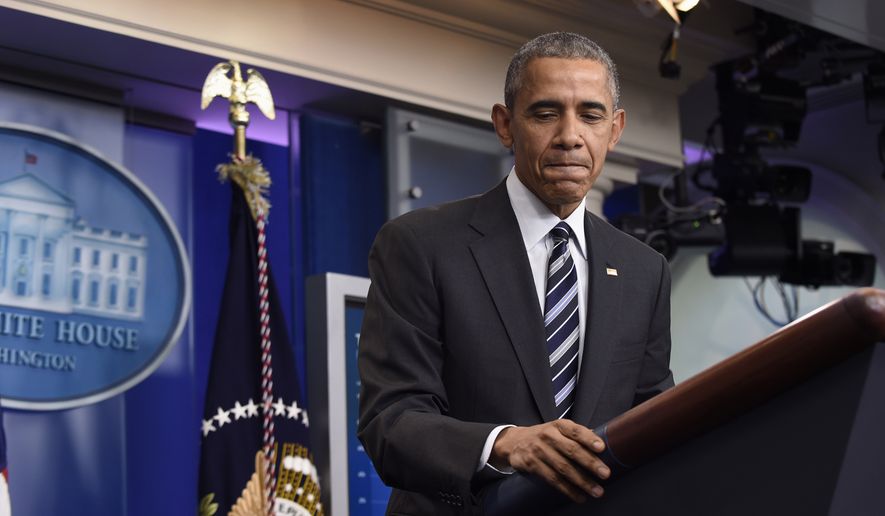Obamacare’s failed health co-ops could be leaving taxpayers with a massive, unpayable IOU.
A new report released Thursday found that the co-ops, once seen as a key part of the president’s national health care law, have not repaid a single dollar of the combined $1.2 billion they received in federal loans, and Senate Republicans are arguing that the U.S. Treasury will never be made whole.
Under the Affordable Care Act, the administration extended $2.4 billion in start-up and solvency loans to 23 nonprofit plans that were supposed to empower consumers and offer an alternative to big corporate players in the new marketplace.
Yet many of the co-ops had a hard time pricing their products or competing for market share, and 12 of them have gone belly-up, forcing 740,000 people in 14 states scrambling to find new health insurance coverage, the GOP-authored report said.
Senate Republicans said the failed co-ops’ balance sheets reveal more than $1 billion in unpaid medical claims and other liabilities that far exceed their reported assets, leaving little — if any — cash to repay taxpayers.
“Where’s it gonna come from?” said Sen. Rob Portman, the Ohio Republican who chairs the investigatory panel on the Homeland Security and Governmental Affairs Committee.
Democrats originally promoted the co-ops, or “Consumer Operated and Oriented Plans,” during the Obamacare debate of 2009 as a fallback to attempt to win passage of a “public option,” or government-run plan to be offered alongside private plans in the new web-based health exchanges to be set up in the states.
Designed to give consumers more bargaining power in the marketplace, the co-op program instead has turned into a major headache for President Obama, who is trying to place his signature law on firm footing before leaving office.
One of the co-op plans, CoOportunity Health of Nebraska and Iowa, abruptly shut down in early 2015, foreshadowing the ill fates of co-ops in Louisiana, Nevada, New York, Kentucky, Tennessee, Colorado, Oregon, South Carolina, Utah, Arizona and Michigan.
Andy Slavitt, acting administrator for the Centers for Medicare and Medicaid Services, testified that CoOportunity should have been shut down even before the 2015 plan year, though he argued his agency didn’t have enough claims data to size up and shutter more co-ops until the middle of last year.
As it stands, he said the Justice Department is doing what it can to wrest back some of the government’s money from the failed co-ops.
The department has frozen “tens of millions” of dollars in payments that the plans expected from Obamacare programs designed to spread out risk in the marketplace, and it is eyeing funds that co-ops might recoup from their vendors.
In the end, taxpayers will only get back an unknowable fraction of the $1.2 billion, Mr. Slavitt said.
“There will be funds recovered for the taxpayers,” he told senators, though he refused to offer a dollar amount. “I can’t guess. It would be irresponsible for me to guess.”
No bets on recovery
Sen. Ben Sasse, Nebraska Republican and a leading critic of the co-ops, asked if a “fair bet” on the over-under for recovery would be around $100.
“I’m not going to take that bait,” Mr. Slavitt said, explaining he didn’t want to hamper the Justice Department’s negotiations and leverage.
Congressional Democrats say the GOP hastened the co-ops’ demise by slashing start-up loans from $6 billion to $2.4 billion and prohibiting the co-ops from spending the money on marketing. Their GOP rivals contend the co-ops did themselves in by miscalculating enrollment or underpricing their products in a tough market.
Mr. Portman, who faces re-election in November, said while states enjoy wide discretion over their insurance markets, the Department of Health and Human Services had sole discretion over federal loans and should have stepped in sooner.
“Despite getting regular reports that the co-ops were hemorrhaging cash, HHS took no corrective action for over a year,” he said.
He also said the HHS threw good money after bad to bolster its “unfortunate adventure” into the health care start-up business. Three of the failed co-ops — plans in New York, Kentucky and the joint venture in Iowa and Nebraska — received tens of millions of dollars in additional solvency loans despite their struggles.
Mr. Slavitt said the administration must accept responsibility for the co-op failures, though he noted that most of the loans were obligated before he got to the agency.
He also said insurers can set their prices just once per year, and it takes a while for claims data and fiscal patterns to emerge. That is why the administration and states did not shut down many plans until the cusp of the third open enrollment period this past fall.
Indeed, state regulators shut down co-ops in quick succession last year so that customers could quickly switch to other options during the 2016 enrollment period from Nov. 1 to Jan. 31.
The rapid closures breathed new life into an issue that burst into view in July, when the HHS inspector general said the co-ops lost hundreds of millions of dollars in their first year and didn’t attract anywhere near the number of customers they had been banking on, raising the prospect of default.
Mr. Sasse, in particular, highlighted Mr. Slavitt’s admission that the CoOportunity program “should never have been allowed to go into the 2015 year — either by the co-op or by ourselves.”
“That’s a significant admission,” the senator said, “so I appreciate your honesty on that.”
• Tom Howell Jr. can be reached at thowell@washingtontimes.com.




Please read our comment policy before commenting.